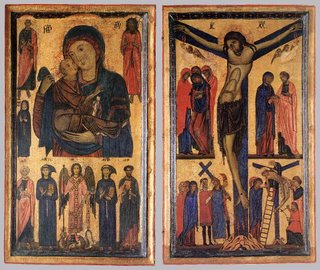Yesterday was Mother's Day, but let us stay with our dear Blessed Mother Mary and her loving son Karol for a while longer.
Encyclical Letter Veritatis Splendor
His Holiness Pope John Paul II
Feast of the Transfiguration of the Lord, August 6, 1993
Encyclical Letter Veritatis Splendor
His Holiness Pope John Paul II
Feast of the Transfiguration of the Lord, August 6, 1993
Mary, Mother of Mercy
118. Let us entrust ourselves, the sufferings and the joys of our life, the moral life of believers and people of good will, and the research of moralists, to Mary, Mother of God and Mother of Mercy.Mary is Mother of Mercy because her Son, Jesus Christ, was sent by the Father as the revelation of God's mercy (cf. Jn 3:16-18). Christ came not to condemn but to forgive, to show mercy (cf. Mt 9:13). And the greatest mercy of all is found in his being in our midst and calling us to meet him and to confess, with Peter, that he is "the Son of the living God" (Mt 16:16). No human sin can erase the mercy of God, or prevent him from unleashing all his triumphant power, if we only call upon him. Indeed, sin itself makes even more radiant the love of the Father who, in order to ransom a slave, sacrificed his Son: his mercy towards us is Redemption.
This mercy reaches its fullness in the gift of the Spirit who bestows new life and demands that it be lived. No matter how many and great the obstacles put in his way by human frailty and sin, the Spirit, who renews the face of the earth, makes possible the miracle of the perfect accomplishment of the good. This renewal, which gives the ability to do what is good, noble, beautiful, pleasing to God and in conformity with his will, is in some way the flowering of the gift of mercy, which offers liberation from the slavery of evil and gives the strength to sin no more. Through the gift of new life, Jesus makes us sharers in his love and leads us to the Father in the Spirit. . . .
120. Mary is also Mother of Mercy because it is to her that Jesus entrusts his Church and all humanity. At the foot of the Cross, when she accepts John as her son, when she asks, together with Christ, forgiveness from the Father for those who do not know what they do (cf. Lk 23:34), Mary experiences, in perfect docility to the Spirit, the richness and the universality of God's love, which opens her heart and enables it to embrace the entire human race. Thus Mary becomes Mother of each and every one of us, the Mother who obtains for us divine mercy.
Mary is the radiant sign and inviting model of the moral life. As Saint Ambrose put it, "The life of this one person can serve as a model for everyone," and while speaking specifically to virgins but within a context open to all, he affirmed: "The first stimulus to learning is the nobility of the teacher. Who can be more noble than the Mother of God? Who can be more glorious than the one chosen by Glory Itself?"Mary lived and exercised her freedom precisely by giving herself to God and accepting God's gift within herself. Until the time of his birth, she sheltered in her womb the Son of God who became man; she raised him and enabled him to grow, and she accompanied him in that supreme act of freedom which is the complete sacrifice of his own life.
By the gift of herself, Mary entered fully into the plan of God who gives himself to the world. By accepting and pondering in her heart events which she did not always understand (cf. Lk 2:19), she became the model of all those who hear the word of God and keep it (cf. Lk 11:28), and merited the title of "Seat of Wisdom." This Wisdom is Jesus Christ himself, the Eternal Word of God, who perfectly reveals and accomplishes the will of the Father (cf. Heb 10:5-10). Mary invites everyone to accept this Wisdom. To us too she addresses the command she gave to the servants at Cana in Galilee during the marriage feast: "Do whatever he tells you" (Jn 2:5).
Mary shares our human condition, but in complete openness to the grace of God. Not having known sin, she is able to have compassion on every kind of weakness. She understands sinful man and loves him with a Mother's love. Precisely for this reason she is on the side of truth and shares the Church's burden in recalling always and to everyone the demands of morality. Nor does she permit sinful man to be deceived by those who claim to love him by justifying his sin, for she knows that the sacrifice of Christ her Son would thus be emptied of its power. No absolution offered by beguiling doctrines, even in the areas of philosophy and theology, can make man truly happy: only the Cross and the glory of the Risen Christ can grant peace to his conscience and salvation to his life.O Mary, Mother of Mercy, watch over all people, that the Cross of Christ may not be emptied of its power, that man may not stray from the path of the good or become blind to sin, but may put his hope ever more fully in God who is "rich in mercy." May he carry out the good works prepared by God beforehand and so live completely "for the praise of his glory."




No comments:
Post a Comment